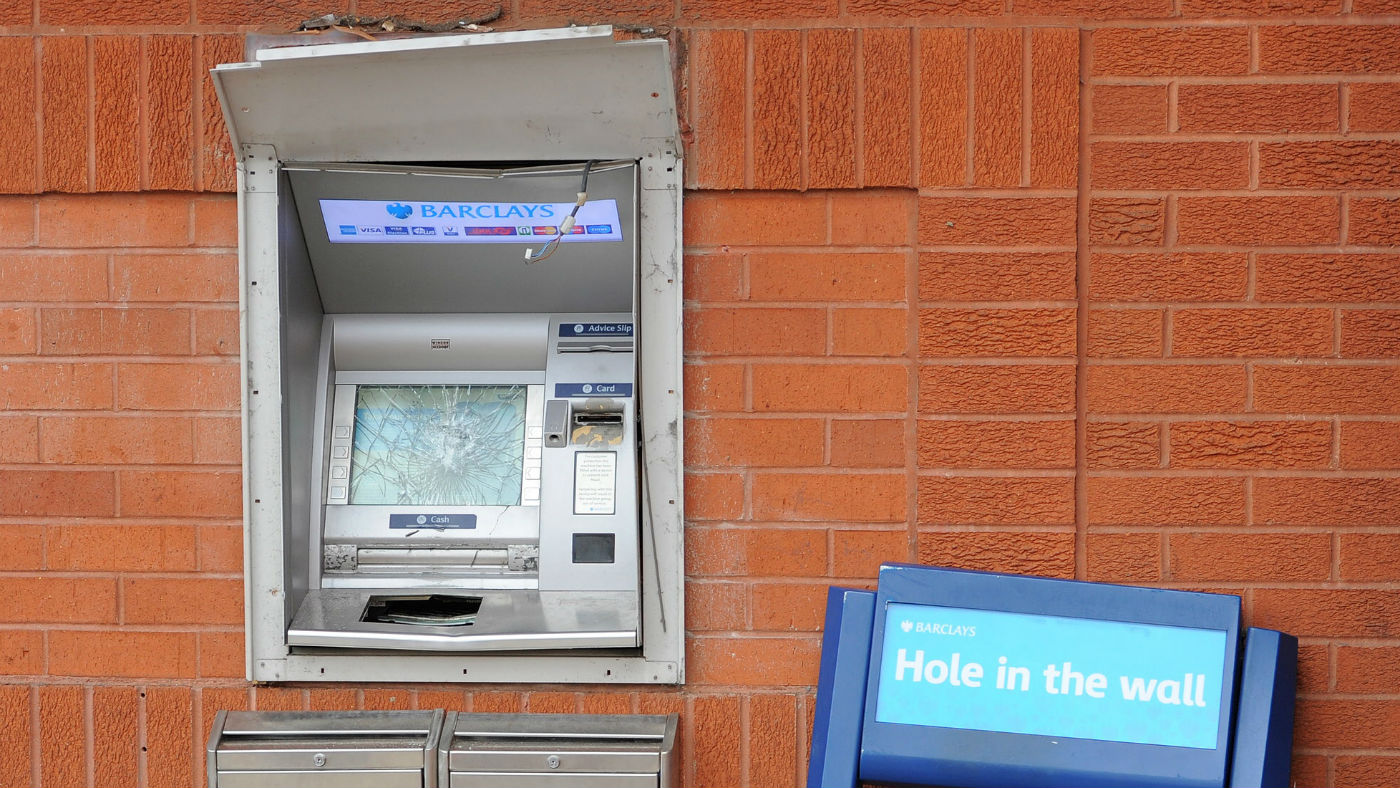Britain’s ‘broken’ cash system leaves millions vulnerable
MPs and regulators warn closure of free-to-use cash machines in rural areas leave customers isolated

A free daily email with the biggest news stories of the day – and the best features from TheWeek.com
You are now subscribed
Your newsletter sign-up was successful
In an increasingly cashless society, Britain’s “broken” cash system could leave vulnerable people cut off from the money they need to survive, MPs and regulators have warned.
As UK businesses and consumers move to digital payments, there are concerns that the closure of free-to-use cash machines in rural areas could leave customers isolated.
While there are still more than 60,000 ATMs in Britain, consumer campaign group Which? said that 3,000 cash machines vanished from Britain’s streets in the last six months of 2018.
The Week
Escape your echo chamber. Get the facts behind the news, plus analysis from multiple perspectives.

Sign up for The Week's Free Newsletters
From our morning news briefing to a weekly Good News Newsletter, get the best of The Week delivered directly to your inbox.
From our morning news briefing to a weekly Good News Newsletter, get the best of The Week delivered directly to your inbox.
The London Evening Standard says “concerns about ATM closures were heightened last year when a row broke out about changes to the future funding of cashpoints”.
According to Reuters, “currently banks effectively subsidise uneconomic cash machines through the 'interchange' fee set by Link”. However, the Payment Systems Regulator and Link locked horns last year over closures of “protected” or uneconomic cash machines, and Link’s plan to cut the interchange fee in phases.
Cash machine operators have warned that controversial planned reductions in the fees they receive from card issuers will make thousands of cash points uneconomical to run.
“This has led to fears of 'ATM deserts' being created in areas outside the UK’s large cities,” says the Financial Times.
A free daily email with the biggest news stories of the day – and the best features from TheWeek.com
Nicky Morgan, chair of the Treasury Select Committee, has said “the national system for people to have access to their cash via machines is basically broken”, amid calls for a fundamental rethink of the entire system.
Calling on government to set up a new regulator to oversee cash “and ensure no-one is excluded and left struggling to go about their daily lives” Jenni Allen, from Which? said “cash is also a vital backup as fallible digital payments grow in popularity”.
Last year technological glitches at TSB, when thousands of customers were locked out of their online accounts last year after a bungled IT migration, “illustrated the dangers for customers reliant on digital banking”, says the FT.
Cash use has halved in the last ten years, and is expected to halve again in the coming decade. In 2017, debit cards overtook cash as the UK's most popular payment method.
In December, the Ceeney Report that suggested the UK risked “sleepwalking” into becoming a cashless society with many groups such as the old, disabled and those in rural areas particularly vulnerable.
The closure of rural cash machines comes after two-thirds of the UK’s bank branches have been scrapped over the past 30 years.
It means one-fifth of households are now located more than 3km from their nearest bank, even though almost three quarters of the population still use cash frequently, and banknotes and coins are still a necessity for eight million people, according to Which?.
-
 The Olympic timekeepers keeping the Games on track
The Olympic timekeepers keeping the Games on trackUnder the Radar Swiss watchmaking giant Omega has been at the finish line of every Olympic Games for nearly 100 years
-
 Will increasing tensions with Iran boil over into war?
Will increasing tensions with Iran boil over into war?Today’s Big Question President Donald Trump has recently been threatening the country
-
 Corruption: The spy sheikh and the president
Corruption: The spy sheikh and the presidentFeature Trump is at the center of another scandal
-
 Labour shortages: the ‘most urgent problem’ facing the UK economy right now
Labour shortages: the ‘most urgent problem’ facing the UK economy right nowSpeed Read Britain is currently in the grip of an ‘employment crisis’
-
 Will the energy war hurt Europe more than Russia?
Will the energy war hurt Europe more than Russia?Speed Read European Commission proposes a total ban on Russian oil
-
 Will Elon Musk manage to take over Twitter?
Will Elon Musk manage to take over Twitter?Speed Read The world’s richest man has launched a hostile takeover bid worth $43bn
-
 Shoppers urged not to buy into dodgy Black Friday deals
Shoppers urged not to buy into dodgy Black Friday dealsSpeed Read Consumer watchdog says better prices can be had on most of the so-called bargain offers
-
 Ryanair: readying for departure from London
Ryanair: readying for departure from LondonSpeed Read Plans to delist Ryanair from the London Stock Exchange could spell ‘another blow’ to the ‘dwindling’ London market
-
 Out of fashion: Asos ‘curse’ has struck again
Out of fashion: Asos ‘curse’ has struck againSpeed Read Share price tumbles following the departure of CEO Nick Beighton
-
 Universal Music’s blockbuster listing: don’t stop me now…
Universal Music’s blockbuster listing: don’t stop me now…Speed Read Investors are betting heavily that the ‘boom in music streaming’, which has transformed Universal’s fortunes, ‘still has a long way to go’
-
 EasyJet/Wizz: battle for air supremacy
EasyJet/Wizz: battle for air supremacySpeed Read ‘Wizz’s cheeky takeover bid will have come as a blow to the corporate ego’